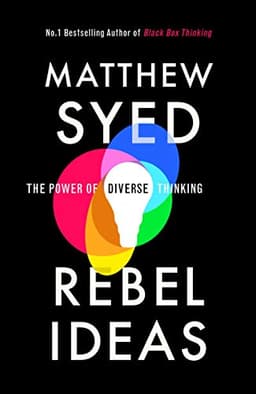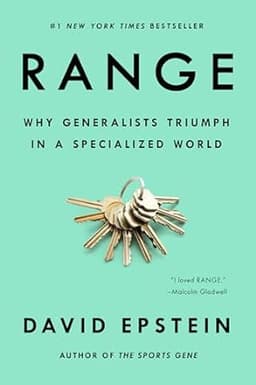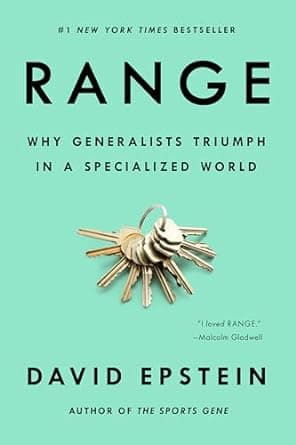
Rebel Ideas Book Summary
The Power of Diverse Thinking
Book by Matthew Syed
Summary
Matthew Syed reveals the vital ingredient missing from our understanding of success: cognitive diversity. Rebel Ideas shows how bringing together different insights, perspectives and thinking styles turbocharges creativity, problem-solving and decision-making, to improve performance in today's complex world.
Sign in to rate
Average Rating: 1
The CIA's Blindspot Before 9/11
In the years before 9/11, the CIA suffered from a lack of diversity that left them unable to detect warning signs about the impending terrorist attack. The agency was overwhelmingly staffed by white, male, Protestant Americans who struggled to understand the significance of intelligence about Osama bin Laden and Al-Qaeda. As an insider noted, "the CIA couldn't perceive the danger. There was a black hole in their perspective."
Section: 1, Chapter: 1
Homogeneity Breeds Collective Blindness
Homogenous groups, even when composed of smart individuals, often become collectively blind. They tend to share the same assumptions and blindspots. Homophily, the tendency of like to associate with like, acts as an invisible force pulling groups towards conformity of thought. Diverse groups that contain different perspectives are less likely to fall prey to collective blindness.
Section: 1, Chapter: 1
The Power Of Diverse Perspectives
"If two people have perspectives that are incomplete, joining them together can yield more insight, not less. They are both wrong, so to speak. They both miss something. But they are wrong in different directions. This means that their shared picture is richer and more accurate."
Section: 1, Chapter: 1
Welcome Diverse Views
To counteract our tendency towards homophily and reap the benefits of diversity, we must actively seek out people with different backgrounds and perspectives from our own. When assembling a team or group to tackle a problem, consider the range of cognitive diversity, not just expertise. Intentionally engage with those who see things differently, even if it feels uncomfortable at first. Over time, it will expand your own thinking.
Section: 1, Chapter: 1
Why Diverse Teams Beat Homogenous Ones
Wise groups express different properties than homogenous ones:
- They contain people with perspectives that challenge, augment, diverge and cross-pollinate, not parrot the same views
- Each person contributes useful but partial information from their region of the "problem space"
- Their collective intelligence emerges from the interaction of their diverse views In contrast, homogenous groups become echo chambers that reinforce shared assumptions. Even when composed of smart people, they collectively underperform.
Section: 1, Chapter: 2
How Diversity Powers Prediction
A study by psychologist Jack Soll found that the average prediction of six diverse economic forecasters was 15% more accurate than even the top individual forecaster. The key was that each economist used different mental models which, when aggregated, filled in each other's blindspots. Homogenous teams of "best" forecasters who all thought alike performed worse than diverse teams with different perspectives.
Section: 1, Chapter: 2
Seek Germane Cognitive Diversity
When assembling a team, aim for germane cognitive diversity - a range of perspectives and thinking styles specifically relevant to the problem at hand. Diversity of backgrounds is beneficial insofar as it translates into diversity of insights. Random diversity for its own sake is less impactful than curated diversity aligned to the team's objectives. Focus on the sweet spot of diverse views that can meaningfully cross-pollinate.
Section: 1, Chapter: 2
Dominance Dynamics Undermine Performance
Dominance hierarchies are a pervasive feature of human groups. While they can enable smooth coordination, they often stifle the upward flow of ideas and information. Subordinates self-censor in the presence of dominant leaders. What feels like cohesive teamwork may in fact be an echo chamber that amplifies blindspots. Dominance is appropriate for executing plans but counterproductive for making them.
During the 1996 Mount Everest disaster, the steep authority gradient between guides and clients suppressed vital information flow that could have averted tragedy. Clients noticed troubling signs, like deteriorating weather, but didn't feel empowered to speak up forcefully to their leaders. Guides failed to elicit input and concerns from the group. The result was critical decisions being made without the full picture, leading step-by-step to catastrophe.
Section: 1, Chapter: 3
Psychological Safety Powers Collective Intelligence
Prestigious leaders create psychological safety - a climate where people feel they can speak up without risking backlash. They signal receptivity to dissent and bad news, by:
- Explicitly inviting input and skepticism
- Acknowledging fallibility and mistakes
- Giving credit and praise for those who surface problems
- Actively drawing out opinions from quieter team members
To access your team's full cognitive diversity, make space for constructive dissent. Set ground rules that encourage respectful debate. Actively draw out minority views and thank people for challenging the consensus. Publicly change your own mind in response to good arguments. Use anonymous feedback and voting to elicit unvarnished opinions. Build a culture where good-faith criticism and surfacing of problems is welcomed, not punished.
Section: 1, Chapter: 3
The Surprising Secret Of Immigrant Innovators
Immigrants are twice as likely as native-born citizens to start new businesses and obtain patents. For example, 43% of Fortune 500 companies were founded by immigrants or their children. The secret is that immigrants combine an "outsider mindset" with diverse experiences:
- Coming from a different culture enables them to question assumptions and see new possibilities
- Having exposure to different ideas gives them more material for recombination into novel forms Together, this allows immigrants to be powerful engines of innovation.
Section: 1, Chapter: 4
Recombinant Innovation Drives Progress
Novel innovations increasingly come from recombining existing ideas in new ways, not from incremental improvements within a domain. Just as sexual recombination accelerates biological evolution, idea recombination accelerates technological and economic progress. Knowledge builds cumulatively as ideas have "sex" and spawn imaginative offspring. The most impactful scientific papers and patents are those that bridge between previously disconnected fields.
To boost your own creativity, deliberately step outside your familiar knowledge zones. Read journals and books from other fields. Attend lectures and conferences unrelated to your expertise. Take up wide-ranging hobbies. Travel to different cultures. Immerse yourself in the unfamiliar to see your own domain with fresh eyes.
Section: 1, Chapter: 4
The Power Of Conceptual Distance
"When we are immersed in a topic, we are surrounded by its baroque intricacies. It is very easy to stay there, or to simply think about making superficial alterations to its interior. We become prisoners of our paradigms. Stepping outside the walls, however, permits a new vantage point. We don't have new information, we have a new perspective."
Section: 1, Chapter: 4
The Echo Chamber Effect
Echo chambers are social structures where people connect with like-minded others and conflicting views are excluded. They create a pernicious cycle:
- Homophily and fine-grained sorting concentrate people into bubbles of similarity
- Repeated exposure to confirming views increases confidence and extremism
- Divergent views, when encountered, are discounted as coming from outsiders
- Raising walls of distrust further isolates members from wider society
A study of social networks in university dorms found that larger dorms, despite their greater diversity, had more homogenous friend groups. Students used the large pool of options to "fine-tune" their social circles to be just like them. Smaller dorms forced exposure to more different people. As one researcher put it: "It sounds ironic, but it is quite predictable. In the smaller universities, there are fewer available choices, and people have to make connections with people who are comparatively more different."
Section: 1, Chapter: 5
Avoid Intellectual Incest
To avoid falling into an echo chamber of your own views:
- Follow people you disagree with on social media
- Read news sources from diverse political perspectives
- Join clubs and activities not related to your usual identity groups
- Cultivate friends from different walks of life
- Practice the "ideological Turing test" of steelmanning views you dispute
Echo chambers atrophy our ability to understand different views. Inoculate yourself through deliberate exposure to diverse intellectual fare.
Section: 1, Chapter: 5
The Flaw Of The Average
In the 1950s, the US Air Force measured over 4,000 pilots on 140 dimensions to calculate the "average" pilot size. But when they looked at how many individual pilots actually fit this average, the answer was zero. No real pilots fit the fictional average. Designing for the average produces a one-size-fits-none solution. For example, adjustable cockpits that fit a range of real sizes dramatically reduced accidents compared to fixed average cockpits.
Section: 1, Chapter: 6
Averages Hide Individual Fit
Designing standardized systems around an average person is an alluring but misleading approach. Averages mask the variation between individuals. Whether for cockpits or diets or schools, one-size-fits-all solutions underperform compared to adjustable ones. Adapting to individual diversity, rather than suppressing it, unleashes potential. Don't force conformity to an arbitrary standard - make the system adapt to the person.
Section: 1, Chapter: 6
The Surprising Value Of Misfit Employees
At a large company, employees who used non-default web browsers performed better and stayed longer in their jobs. Why? Using Chrome or Firefox instead of default Safari or Internet Explorer was a signal they questioned defaults. This "misfit" quality translated to being more likely to spot opportunities for improvement at work while "fit" employees accepted the status quo unthinkingly.
Section: 1, Chapter: 6
Human Evolution's Secret Weapon
Humans uniquely evolve both genetically and culturally. Our inventions, from fire to water containers to clothing, modify our biological selection pressures. Technology builds cumulatively, feeding back to shape our bodies, brains and societies in a cycle of gene-culture coevolution. Diversity of ideas, recombined and transmitted through this collective brain, is the engine of human progress.
Humanity dominates the planet not because we have big brains as individuals, but because we are the only species to network our brains into a collective intelligence. Language, social learning and culture enable us to accumulate knowledge across generations in a way no other animal can. We are not born smarter than other primates - our individual intelligence is an emergent property of the cultural knowledge we soak up from our social groups. Connection is our competitive advantage.
Section: 1, Chapter: 7
Diversify Your Inputs
To tap into the power of collective intelligence in your own life:
- Assemble diverse knowledge sources, from books to personal contacts
- Expose yourself to disciplines and frameworks outside your usual domain
- Engage people with different backgrounds to expand your perspective
- Bridge between disparate ideas to generate novel combinations
- Participate in knowledge-sharing communities to access distributed insights
Harnessing cognitive diversity is the key to personal and collective adaptability in a fast-changing world.
Section: 1, Chapter: 7
Related Content


Range Book Summary
David Epstein
"Range" challenges the conventional wisdom that early specialization is the key to success. Instead, Epstein argues that in our increasingly complex and unpredictable world, it is those with broad experience and diverse skills who are best equipped to thrive.
"Range" challenges the conventional wisdom that early specialization is the key to success. Instead, Epstein argues that in our increasingly complex and unpredictable world, it is those with broad experience and diverse skills who are best equipped to thrive.
Personal Development
Learning
Psychology

